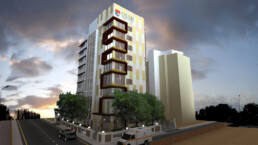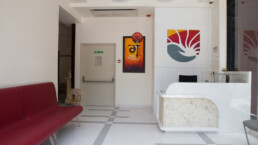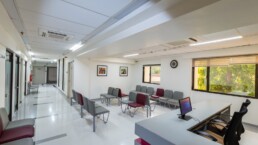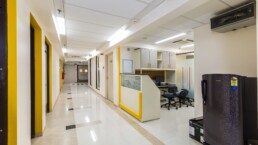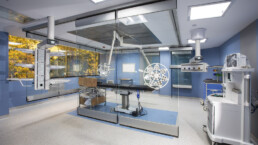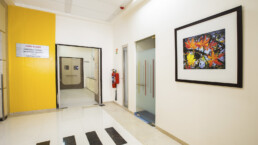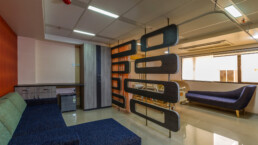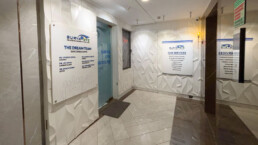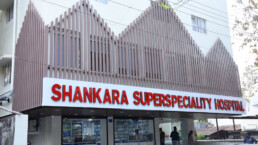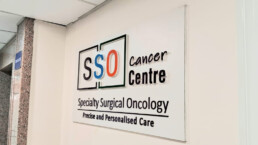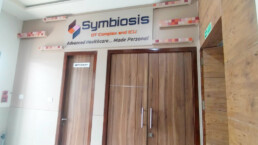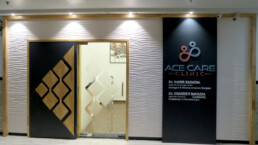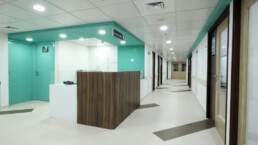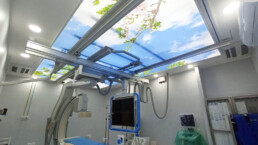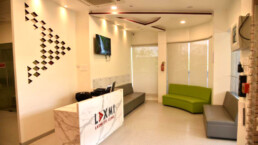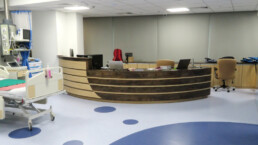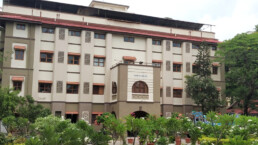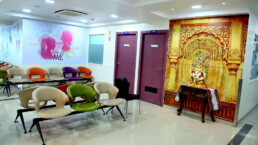Our Client’s Vision
Having practised medicine in Mulund (Mumbai, Maharashtra) for the past 45 years, our client’s vision was to create an affordable, patient-centric healthcare institution, aiming at patients’ utmost satisfaction, following the best, current medical practices, pertaining to multiple specialities under one roof. The aim was to establish a quality healthcare facility, with contemporary design, that will deliver empathetic care through the best medical practices, while upholding the culture and values of true professionalism.
Technical Specifications of the Project
| Particulars | Description |
| Name of the Client | Upasani Super Speciality Hospital (Mumbai) |
| Nature of the Project | Greenfield, Complete Architectural Design & Consultancy |
| Design Area | Approximately 50,000 sq. ft. |
| Scope of Work | Facility planning for the following spaces.
Other areas of work include facility planning, architectural designing, interior designing, project management consultancy, MEP services and assistance. |
| Project Team | Principal Architect – Ar. Kshititi Nagarkar
Project Head – Ar. Priyanka Dhuri Project Team – Ar. Saisha Bhole, Ar. Sneha Rananaware & Ms. Siddhi Karalkar |
Walk-through of the completed project
Our Approach for Executing the Super Speciality Hospital Project
The client’s vision of establishing a patient-centred facility was achieved through meticulous planning, keeping the flow of patients and staff in mind, along with functionality. To achieve cohesiveness with the brand, the colour palette for the interiors of the facility was inspired from the elemental colours of its logo itself. Colour patches were strategically incorporated to liven up the space and to uplift the aura of healing. For smooth movement of people and services, the functional areas were segregated into different floors, as elaborated herewith.
| Floor | Functional Areas |
| Ground Floor | Reception, waiting areas, casualty ward with rear access for ambulance and a 24-hour pharmacy. |
| First Floor | Out-Patient Departments (OPDs), waiting areas, billing desks and X-ray room. |
| Second Floor | Gynaecology department comprising of Gynaecology OPD with attached treatment room, scheduling desk, waiting area, labor room and labor operation theatre with necessary service areas. |
| Third Floor | Operation Theatre (OT) complex comprising of two major OTs, including a Room-in-Room OT. |
| Fourth Floor | Intensive Care Units (ICUs), including Surgical Intensive Care Unit (SICU), Medical Intensive Care Unit (MICU) and High Dependency Unit (HDU), along with an Isolation ward. |
| Fifth Floor | Physiotherapy ward, Cardiac Catheterization lab (Cath lab), dialysis room and twin-sharing patient rooms. |
| Sixth, Seventh and Eight Floors | Patient rooms, including general ward, twin-sharing rooms, single rooms and deluxe VIP rooms, with in-suite washrooms. |
Salient Features of This Project
- Compartmentalization of the operations of the facility was focussed on, during the designing process. The plan ensured that the majority of public movements, for minor consultations and other medical needs, would be contained within the ground and first floor. Speciality departments and the departments catering to critical procedures, would be housed in second and third floors. The ICU wards were planned on the fourth floor, just a floor above the OTs. The physiotherapy room on the fifth floor had windows facing well-maintained lawns in the periphery of the campus. The rooms to be occupied by patients were planned for the higher floors of the building, to provide magnificent views of the areas surrounding the hospital campus.
- Various elements of neuroaesthetics including colour therapy, were integrated in the design of the facility. For instance, magenta and ice blue colour scheme was used significantly in the floor housing the gynaecology departments. Blue and green colour scheme was used to create a soothing environment in the OT complex. A neutral colour palette of beige with contrasting colours were used for the patient rooms. Lobbies were designed with subtle floor patterns and hints of yellow in the door framework, which gives an array effect while stepping out of the lobby or staircase. The external facade, facing the main street, was accentuated with a design element of continually-opposed ‘Cs’ in dark brown, projecting out from the facade. The design element was replete with Bougainville planted in the projections thereby, giving it a contemporary yet earthy look. An interesting play of pastel beige and browns was chosen to complement the frontal facade design elements to stand out. On the interior, a beautiful brown glazed wall on the staircase facade, carries over the external colour scheme, while allowing ample natural light in the stairwell.
- Perfect balance of aesthetics and functionality of the spaces reinforced by the use of contemporary raw materials, was achieved through innovations in design. One of the main highlights of this, was the Room-in-Room OT. The operating area can be isolated from the areas surrounding it in the OT by the use of movable glass panels. The contained area has a dedicated ventilation system inducing positive air pressure and equipped with HEPA filters, to ensure sterility. The glass panels can be stacked in a corner to allow the complete operating area to be accessed during surgeries which need more space. A wide window, overlooking greenery was incorporated into the design, to allow natural light into the room. The window was vacuum-packed with blinds sandwiched between the glass panes, on which sun-films were affixed for protection. The innovation in design does not compromise on sterility either. The airflow from sterile, semi-sterile and clean zones are managed separately. The flows of sterile and used equipment from the Theatre Sterile Supplies Unit (TSSU) are mapped in a way to avoid any instances of intermingling between them. The resultant design of the OT complex helped to achieve a safe, efficient and unique architectural masterpiece that adhered to all the requisite norms as defined by the National Accreditation Board for Hospitals & Healthcare Providers (NABH).
- Multiple design aspects came together to enhance the functional efficiency of the hospital. For instance, layout optimization of the patient rooms to accommodate beds / recliners for the patients’ relatives with unobstructed path for stretcher movements. Luxuriously appointed VIP rooms with sofa seating and decorative screens for patients’ privacy. Lobbies designed for smooth movement of stretchers and nurse stations located strategically, overlooking maximum number of patient rooms.
- High standards of hygiene achieved by installing natural and artificial ventilation systems, adequate sanitation facilities, the use of anti-bacterial materials, wherever required.
Our Achievements through This Project
Situated in one of the prime locations in the heart of Mulund (Mumbai, Maharashtra) and overlooking plush manicured landscapes in the vicinity, our client envisioned to set up a hospital which would stand out as a landmark for its design, as well as its empathetic approach in delivering healthcare services. As healthcare facility planning and design professionals, we, at Shree Designs, could do our bit to help materialize our client’s vision, in that regard.
We did face a fair bit of challenges, like budgetary control, experimental and innovative use of raw materials, design innovations with the unique Room-in-Room OT, among others. However, our client’s support, willingness and trust in our expertise, helped us in delivering outstanding results and scaling greater heights in our pursuit of creating healing spaces.
![]()
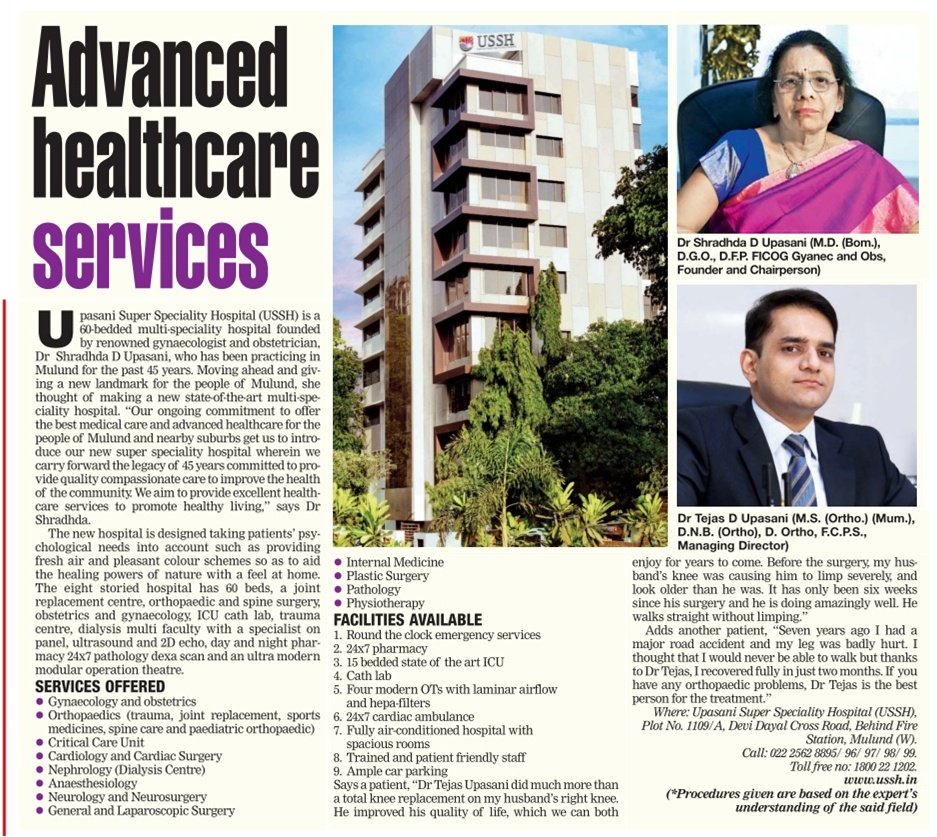
Share
